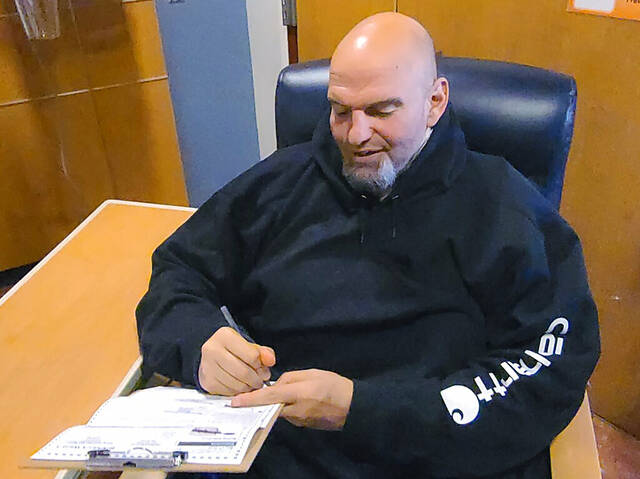https://development.triblive.com/news/pennsylvania/fetterman-says-hes-ready-to-return-to-lieutenant-governor-duties/
Fetterman says he’s ready to return to lieutenant governor duties

Lt. Gov. John Fetterman said in a letter to state legislators Wednesday that he is ready to return to his duties in Pennsylvania’s second-highest elected office, a day after undergoing a procedure to implant a pacemaker with a defibrillator in his chest.
Senate President Pro Tempore Jake Corman will continue to act as lieutenant governor until May 23, Gov. Tom Wolf said in a statement. He has been fulfilling Fetterman’s duties since midday Tuesday.
In a statement issued shortly after 3 p.m. Wednesday, Wolf said Fetterman had notified the legislature that he is “again able to discharge the powers and duties” of his office. He will be able to do so “at the expiration of four days,” as is standard procedure, Wolf said.
Fetterman underwent what he called successful surgery to implant a pacemaker with a defibrillator on the afternoon of the state’s primary, when Fetterman secured the Democratic nomination to run for U.S. Senate in November.
His campaign did not respond to a request for an update on the candidate’s health, including when he might be discharged from the hospital.
Around 6:40 p.m. Tuesday, Fetterman tweeted that his procedure had been a success and he is “on track for a full recovery.”
He later tweeted his thanks to voters and began his fundraising campaign for November’s general election. Who he will face on the Republican ticket remained unclear Wednesday, as candidates David McCormick and celebrity surgeon Dr. Mehmet Oz remained less than a percentage point apart.
I just got out of a procedure to implant a pacemaker with a defibrillator in my heart. We got the all-clear that it was successful, and that I’m on track for a full recovery.Thank yinz for the well-wishes – it means the world to me. ????
Now back to resting + recovering!
— John Fetterman (@JohnFetterman) May 17, 2022
Fetterman’s campaign said over the weekend that he suffered a stroke Friday. He has been in Penn Medicine Lancaster General Hospital since. Fetterman said his stroke was caused by a clot from his heart being out of rhythm. Doctors removed the clot, he said, “reversing the stroke.”
Atrial fibrillation, or A-fib, is a condition in which the heart’s top chambers — the atria — get out of sync with the bottom chambers’ pumping action. Sometimes patients can feel a flutter or racing heart, but often they’re not aware of an episode.
Fetterman said Sunday following the announcement of his stroke that he hadn’t been feeling well Friday and, at his wife’s urging, he went to the hospital.
He voted via emergency absentee ballot from the hospital Tuesday shortly before he announced he’d be having surgery to implant a pacemaker with a defibrillator.
Hours later, he ran away with the Democratic primary vote in a lopsided race against U.S. Rep. Conor Lamb of Mt. Lebanon, state Rep. Malcolm Kenyatta of Philadelphia and Alex Khalil of Montgomery County.
Not every patient who experiences A-fib needs a pacemaker, according to Dr. Srinivas Murali, chair of Allegheny Health Network’s Department of Cardiovascular Medicine.
Murali, who has not treated Fetterman, said some patients are treated with medications and some are treated with cardioversion, which is when the heart is shocked back into rhythm. Another option is ablation: doctors identify where the irregularities are originating and disrupt the electrical signals causing them.
A pacemaker monitors a patient’s heart rate and, as the name suggests, paces the heart. They are programmed at a certain number of beats per minute, Mulari explained, and the pacemaker will take over if the heart rate drops below that threshold.
This type of pacemaker is often referred to as a demand pacemaker, as it paces the heart when there is a demand for it. Some patients can be completely reliant on a pacemaker.
“Some (patients) need a pacemaker if, while attempting to bring them back into a regular rhythm, the heartbeat is too slow,” Murali said. “If the heart is beating too slow, sometimes a pacemaker is necessary to ensure that the heart is beating adequately and normal times a minute.”
A defibrillator detects abnormal heart rhythms that, if not disrupted, “are not compatible with life,” Mulari said. Essentially, they detect and attempt to correct cardiac arrest.
“Should the heart go into one of these life-threatening dangerous rhythms … the defibrillator will sense that and it will deliver a shock to terminate that arrhythmia and restore normal rhythm,” he said.
All defibrillators come with pacemakers so as to pace the heart if it has to be shocked back into a normal rhythm.
It wasn’t clear what prompted Fetterman’s medical team to implant a defibrillator pacemaker.
Many people who get pacemakers or defibrillator pacemakers live for years without any issues or incidents.
Prognosis, Murali said, depends upon the underlying condition that prompted the device to be implanted in the first place.
“These devices are very effective … and people can function normally as long as the underlying condition is managed appropriately,” Murali said. “They can live with a pacemaker or a defibrillator for many, many years.”
Copyright ©2026— Trib Total Media, LLC (TribLIVE.com)
